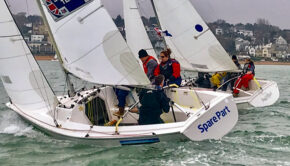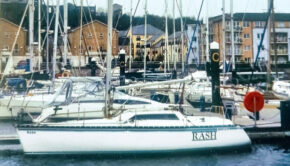Overboard: Stories from off the boat
Published on October 10th, 2019
Falling overboard can occur unexpectedly and end tragically. Staying onboard is always a priority, but even the most experienced can find themselves off the boat. George Harvey shares his experience.
We lost the skipper, Jim Marta from Seattle Yacht Club, overboard on Snake Oil, a Tripp 40, in 2008. The day after the incident I wrote the story below…
Foulweather Bluff is a nice Saturday day race from Edmonds to the Foulweather Bluff bouy, then to Schachet Head, and back to the marina. It’s a reverse start, meaning the smaller boats start first.
With a reverse start you’re passing smaller, slower boats throughout the race, and the larger faster boats are passing you. This makes for some interesting boat-to-boat passing situations and it’s a lot of fun. It’s the first distance race of the fall racing season, and we’ve sailed it a lot and always enjoyed it. This year would be different.
The weather report called for temperatures in the high 50s and winds building to 30 knots. When we started it was overcast and warm. Winds were southerly about 10 knots. We set the chute on port jibe at the start and began a broad reach to the mark.
The winds began to build.
It wasn’t long until it was blowing 20 knots. By that time we were near Point No Point and were sheltered from the rollers that the heavy winds would create. We were still broad reaching and the Skipper was running off in the puffs. We didn’t have any control problems, but we could see other boats rounding up.
We were at hull speed, sometimes higher. Roxanne zoomed past us to leeward, surfing, and throwing up spray and spume and a rooster-tail. Tachyon was creeping up on our stern, and eventually went over us. We toyed with the idea of making it difficult for them, but didn’t. Twenty knots isn’t the time for playing spinnaker reaching games.
The winds continued to build.
Soon it was 25 knots and more boats were rounding up. We continued to run down in the puffs and trim the chute conservatively. When we saw the mark we were a little too low, and it was blowing a little too hard to reach up with the chute, so we set the #3 jib and prepared to drop the chute. This would allow a nice, conservative rounding with minimum screw-ups and we’d be home in a flash. Smart, warm, dry.
The winds continued to build.
Now it was blowing 30 knots and it was past time to get the chute down. The skipper called for the drop. We released the topping lift, but the pole didn’t come down, so the bow couldn’t trip the guy. We tried grinding the downhaul but the pole didn’t move.
Then we were hit by a hard puff, maybe 35 knots, and were on the edge of disaster. The Skipper called to let the guy run. I was trimming the guy, and began to take it off the winch. The guy immediately fouled on the handle. Because we’d been on port jibe throughout the race we’d never taken the port lazy sheet out of the sheet bag and it fouled as well. I worked to free the lines.
Then we got hit by another stronger puff and we were knocked down. It was a fast, violent, vicious hit. Immediately the masthead was six feet off the water. The cockpit turned vertical and the crew held on to anything they could. We were out of control, the spinnaker was thrashing like a wild animal, thundering, jerking the boat around, making control impossible.
MAN OVERBOARD!
I turned and looked aft and could see the Skipper in the water, rapidly disappearing behind us. We were still knocked down, the chute was still up, the guy hadn’t run, we couldn’t control the boat. There was no way we could get back to pick him up.
It was the most horrible thing I’ve ever seen.
It was the most horrible feeling I’ve ever had.
We were out of control and helpless, and the Skipper was gone.
************************
That line of asterisks represents what I remember of the chaos of getting the chute down and getting the boat back under control. I remember nothing. I don’t know if I was brave or cowardly, if I did my duty or didn’t, if I performed or didn’t. I don’t remember a damned thing. I’m really disturbed by that.
I do remember getting back to the Skipper. We were motoring, we’d dropped the jib because it was ripped during the knockdown, so we had a full main up and the motor was running. The deck was a confusion of fouled lines. A smaller sailboat was maneuvering to try to pick up the skipper but when they saw us coming they laid off.
We had him on the starboard, leeward side of the boat, and some of the crew grabbed him. The Skipper is a tall slender guy, I’m guessing about 180 pounds, and they couldn’t get him into the boat. I moved down to help and eventually, and slowly, we were able to get him under the lifelines, into the boat and down below.
He’d been in the water for (I’m guessing) at least ten minutes, and he was not very responsive. I’m not sure how much longer he could have lasted in the water. I was concerned that he might have had a heart attack, or was suffering hypothermia.
We bore off and began motor sailing back to the marina. The Skipper is a tough old guy and he snapped out of it pretty fast. He told us his story of being launched over the rail and head-first into the drink where he swallowed a lot of seawater.
He got into dry clothes and spend much of the trip back vomiting the salt water he’d swallowed into a bucket. We were motoring into a foul tide with 6 to 8 foot rollers and 35 to 45 knots of wind for what seemed like forever.
Usually after a disaster we’re all energized and laughing and full of ourselves for surviving and coming out okay. This time we sat on the deck, stolid, silent, unmoving, as the spray pounded us and the rollers rocked the boat and green water rushed over the deck.
It was a time for quiet introspection: what could have been, did I do my duty, what should we have done differently, how narrowly we avoided killing the Skipper.
*********************
We’re a good boat, and a very skilled and experienced crew. I’d say we average 20 years racing experience per man. When you’re thinking of an overboard situation you always think you’ll just swing around and have the crew member onto the boat in a couple of minutes, no problem.
I suspect, however, that nobody goes overboard in nice conditions. It’s always when it’s blowing too hard, the seas are too high, the boat is under marginal control at best, all lines are fouled, and THEN someone goes overboard. At the worst possible moment. It’s a sobering experience.
The Skipper’s a lucky guy.
——————–
Scuttlebutt wants to feature your overboard experience. Send to editor@sailingscuttlebutt.com.









 We’ll keep your information safe.
We’ll keep your information safe.